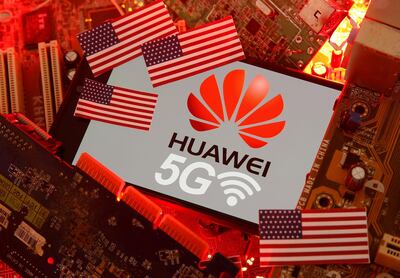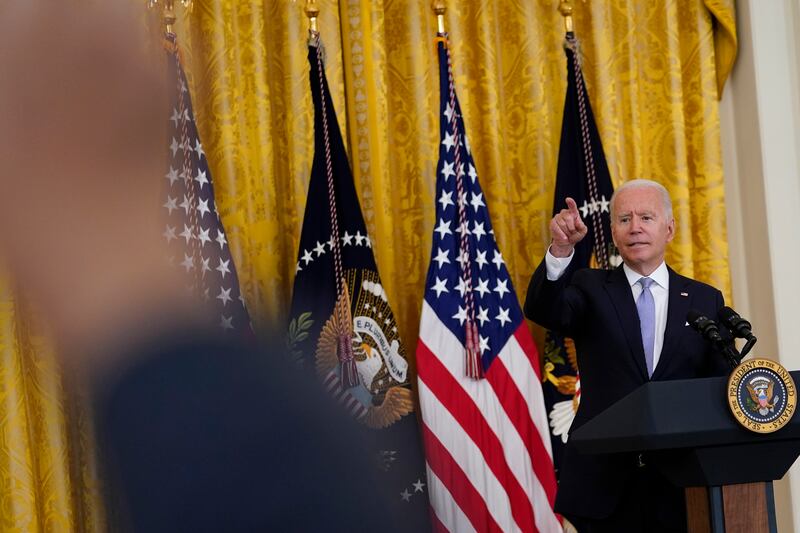US President Joe Biden's ban on Americans investing in dozens of Chinese companies comes into effect on Monday.
The move is intended to stop the flow of capital into defence and surveillance technology companies that the White House says undermine the security or values of the US and its allies.
The list of 59 companies comprises several big names such as China Telecom – one of the largest telcos in the world – Huawei and China's largest chip maker, the Semiconductor Manufacturing International Corporation.
Industry analysts say Mr Biden's executive order, which was signed on June 3, will further deepen the trade disagreement between the world’s two largest economies.
However, the ban is not expected to greatly affect markets on Monday as investors have had enough time to adjust and still have 12 months to divest their holdings.
“There will be no impact on Monday when the order comes into effect,” Neil Campling, co-head of Mirabaud Securities' Global Thematic Group, said.
US-China relations have been deteriorating for several years and they reached new lows during the trade war initiated by former president Donald Trump.
That trade row has “slowly and steadily escalated into a full-blown conflict”, Vijay Valecha, chief investment officer at UAE-based financial consultancy Century Financial, told The National.
“For global markets, [the investment ban] just marks yet another series of news events that are primarily aimed at increasing the political posturing for both sides.”
He said there would be little effect on markets.
“Markets instead are likely to focus on the internal tussle between Chinese authorities and its big tech names who are currently under the increased radar of the China government,” Mr Valecha said.

The US said the new list of Chinese companies will be updated on a rolling basis.
“We fully expect that in the months ahead … we will be adding additional companies to the new executive order's restrictions,” the White House said.
Officials say Mr Biden's executive order was designed to maximise the impact on affected companies while minimising harm to global markets.
Some of the other delisted companies include the Aviation Industry Corporation of China, the China National Offshore Oil Corporation, the China Railway Construction Corporation, the China National Nuclear Corporation and China Unicom.
“A number of the companies on the list are either state owned or privately held. In some respects, the more important impact is of the general ongoing sanctions, such as those against Huawei, which is a Chinese technology champion,” Mr Campling said.
Huawei on Thursday launched its new P50 and P50 Pro smartphones but the devices do not feature 5G network support.
“It is a sign of the toll that US sanctions and a global chip shortage are taking on the Chinese tech firm. You would never have expected Huawei to launch products without 5G, given how fast consumers are adopting 5G handsets,” Mr Campling said.
Last month, the US also banned imports of solar panel materials from China over allegations of forced labour.
Beijing said the accusations were “nothing but rumours with ulterior motives, and downright lies".
The US ban “is a stunning reminder that politics is just as important in shaping market outcomes … pretending all Chinese companies are evil schemers will have a negative impact on the US economy,” Sam Blatteis, chief executive of The Mena Catalysts, told The National.
The Mena Catalysts advises technology companies on policy and government affairs in the Mena region.
Mr Blatteis pointed out the risk of market overreaction.
“Rather than considering how the US should become more competitive, it fixates on defensive measures, undercutting foreign competitors,” said Mr Blatteis, who is the former head of Gulf government relations and public policy at Google.
The latest US order expands the government’s ability to address the threat of Chinese surveillance companies that contribute – both inside and outside of China – to the scrutiny of religious or ethnic minorities or otherwise enable repression and serious human rights abuses, the White House said.
“It signals that the administration will not hesitate to prevent US capital from flowing into China’s defence and related material sector … Tackling these challenges head-on is consistent with the Biden administration’s commitment to protecting core US national security interests and democratic values,” it added.
In June, Chinese foreign ministry spokesman Wang Wenbin said Beijing would retaliate.
“China will take necessary measures to resolutely safeguard the legitimate rights and interests of Chinese enterprises and resolutely support Chinese enterprises in safeguarding their rights and interests in accordance with the law,” he said.







